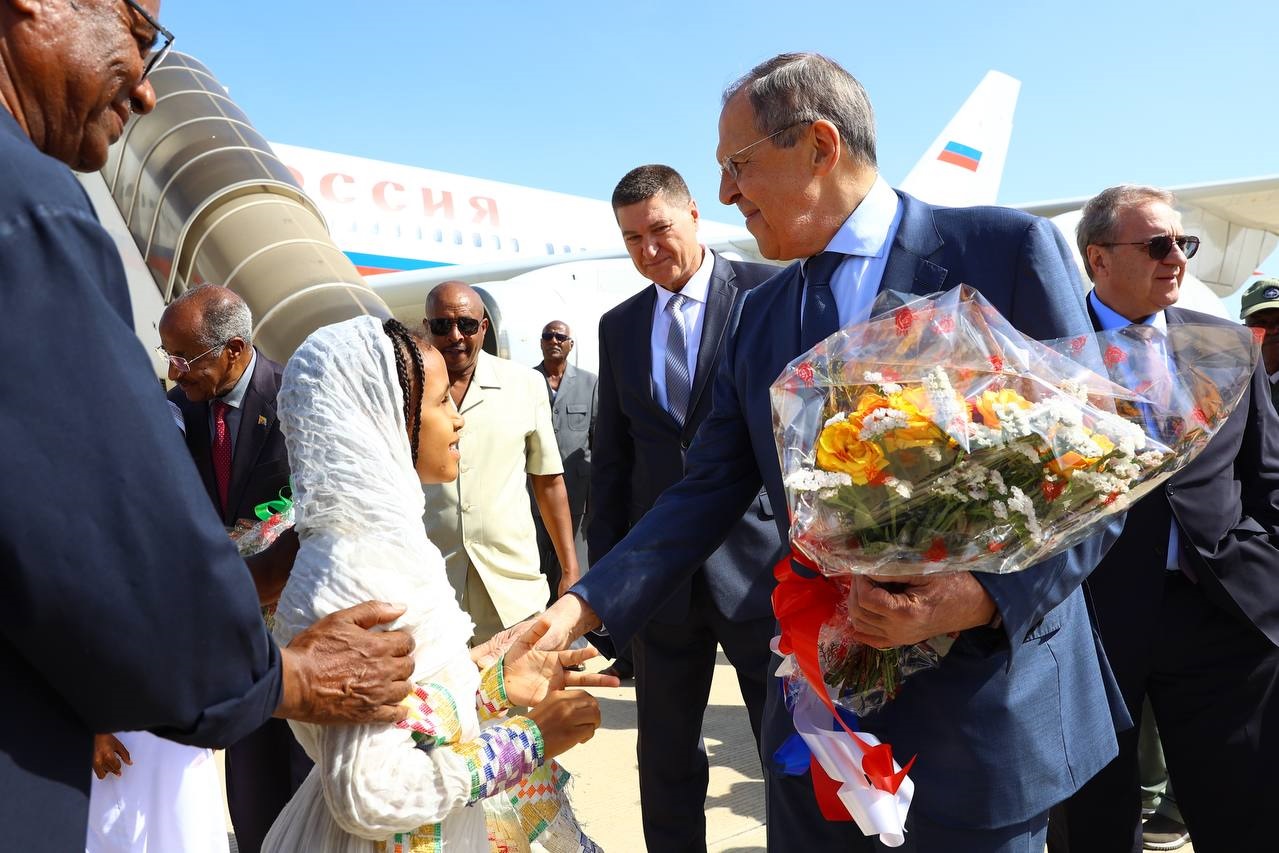
One year into the war, who is winning it? Militarily, Kiev has managed, thanks to Western support, to hold out. But commercially and diplomatically, despite the economic sanctions imposed by many countries, things may be different from what they seem. Russian Foreign Minister Sergey Lavrov’s trips to many African and Middle Eastern countries are irrefutable and extremely worrying proof of this.
Focused, as we rightly are, on trying to deal with the Ukrainian humanitarian catastrophe and defend, on the Donbass border, the security of the entire European Union, we are neglecting to consider the changes that are taking place in the rest of the world, without us Europeans, obliged to concentrate our forces in the military and trade conflict (in which we find ourselves between the Russian anvil and the American and Chinese hammers), being able not only to react, but also to become aware of the gravity of the situation.
The facts. On 2 March 2022, the UN General Assembly, in an emergency meeting, calls on Russia to ‘immediately, completely and unconditionally’ withdraw its military forces from Ukraine: 141 of the 193 UN members support the resolution. China, India and South Africa are among the 35 countries that abstain, while Eritrea, North Korea, Syria, Belarus and (of course) Russia vote against. The resolution is not binding, it only carries political weight and increases Moscow’s international isolation. Far more concrete is the extensive series of sanctions against Moscow that countries such as Europe, the USA, NATO partners and, later, also Japan, Australia and New Zealand, put in place by mutual agreement.
It is a long list of measures that responds to a military war with an economic war and that has a twofold purpose: on the one hand, an attempt is made to weaken the Kremlin’s ability to finance the war; on the other hand, high economic and social costs are imposed on Russia, aiming to weaken the domestic political front. This is nothing new: in 2014, with the undue annexation of Crimea, the West is targeting all those who do business in or with Crimea. Moscow’s reaction: the continuation of attacks in Ukraine and the downing of the Malaysian Airlines plane (17 July 2014) with a surface-to-air missile launched by the Buk System[1] of the Russian secessionist forces, costing the lives of 298 civilians[2] (it was only a few days ago that the European Court of Human Rights decided to proceed against the Russian Federation, which has always denied responsibility for the downing[3]).
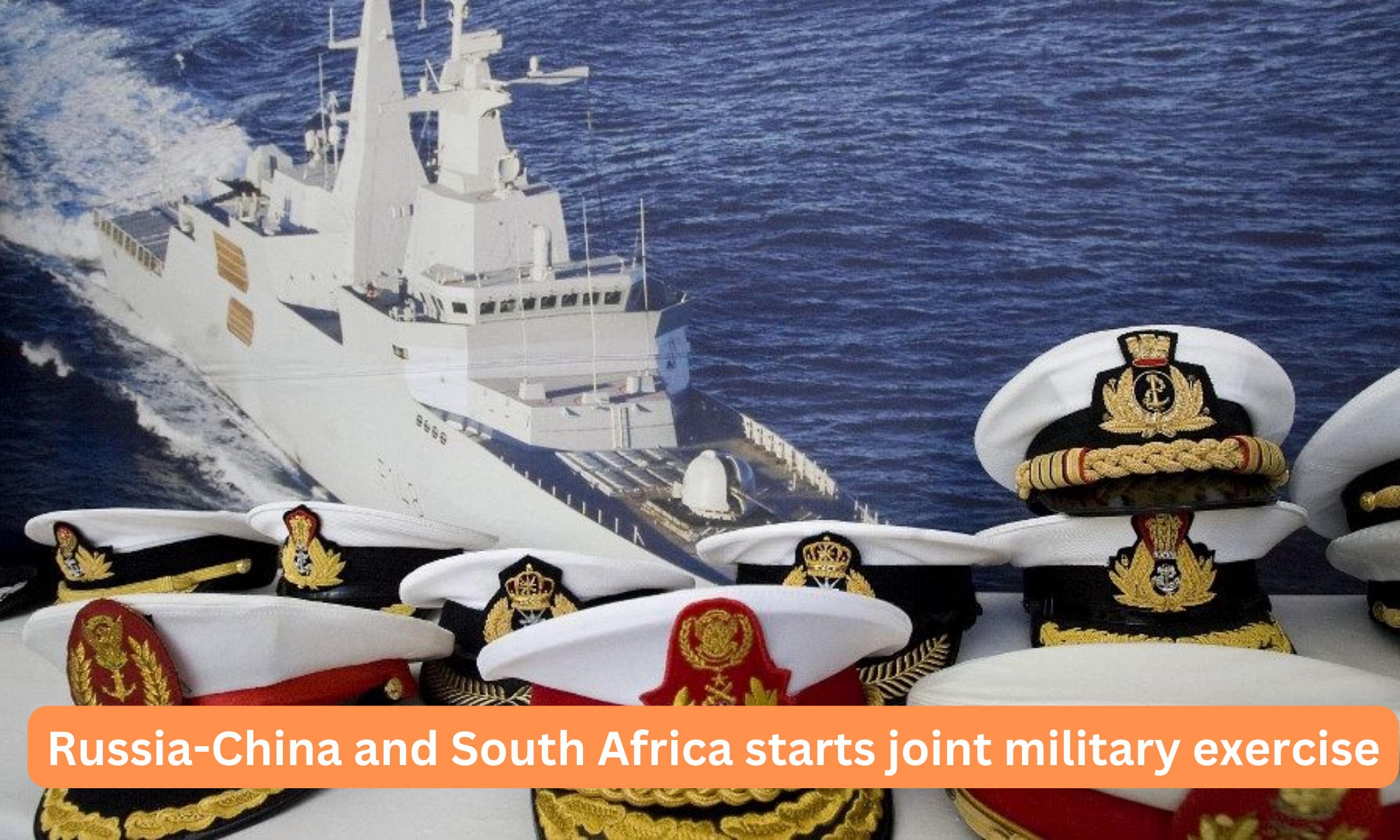
20 February 2023: Russia, China and South Africa begin joint military exercises[4]
The EU and the US began targeting state-owned banks, imposing arms embargoes, restricting technology sales and the export of equipment for the oil industry[5]. The Atlantic Council estimates that, as a result, Russia has lost potential foreign investment of $479 billion, or about one third of Russian GDP, and that GDP has contracted by 8%[6], although the estimate is controversial: some analysts claim that Russia’s real losses remain below 1% of GDP[7].
This time the sanctions are more aggressive, starting with the freezing of the Russian central bank’s foreign assets, which amount to USD 630 billion of foreign exchange reserves[8]. The Bank of Russia is suspended from the Bank of International Settlements[9], preventing anyone from trading in roubles. Some major Russian financial institutions are excluded from the SWIFT international financial exchange system, a digital communication system required for cross-border money transfers, causing delays in payments to and from Russia, particularly in the energy sector[10]. Transactions with state-owned enterprises, the provision of rating services to any Russian person or entity, and new investments in the energy sector are prohibited.
The US bans imports of Russian oil and gas[11] and the UK declares it will give up Russian oil from 2023[12]. The EU, which is 25 per cent dependent on Russian oil and 40 per cent on its gas, claims to become independent of Moscow by 2030[13]. Germany, for its part, blocks the activation of Nord Stream 2, the pipeline built to bring Russian gas to Germany, and from there to the rest of Europe[14]. The sale of luxury goods, including cars, aeroplanes and boats, haute couture products and works of art is banned[15]; exports of goods to Russian companies, especially in the military, computers, chemical, nuclear and electronic fields, are prohibited[16]. All flights by Russian airlines are banned from the airspace of the US, UK, EU and Canada[17], the UK bans Russians from chartering and flying private jets[18].
A race against time begins: oligarchs and partners of the Russian regime must make their assets disappear before they are frozen[19]. The sanctions affect 386 members of the Russian Parliament[20], as well as assets belonging to Russian President Vladimir Putin and his Foreign Minister Sergey Lavrov, frozen in the US, EU, UK and Canada[21]. But that is not enough.
On 15 February 2023, Ursula Von der Leyen announced a new package of sanctions against Moscow: export bans worth more than EUR 11 billion through supply blocks on electronics, special vehicles, spare parts, jet engines, building materials such as antennas or cranes; the blockade is extended to seven Iranian entities and other third countries supplying Shahed drones and other war material during the war[22]. The new package also foresees actions aimed at targeting the propaganda machine, making public lists of Russian propagandists, military commanders, politicians and oligarchs, against whom their assets will be frozen[23].
An anti-colonial power
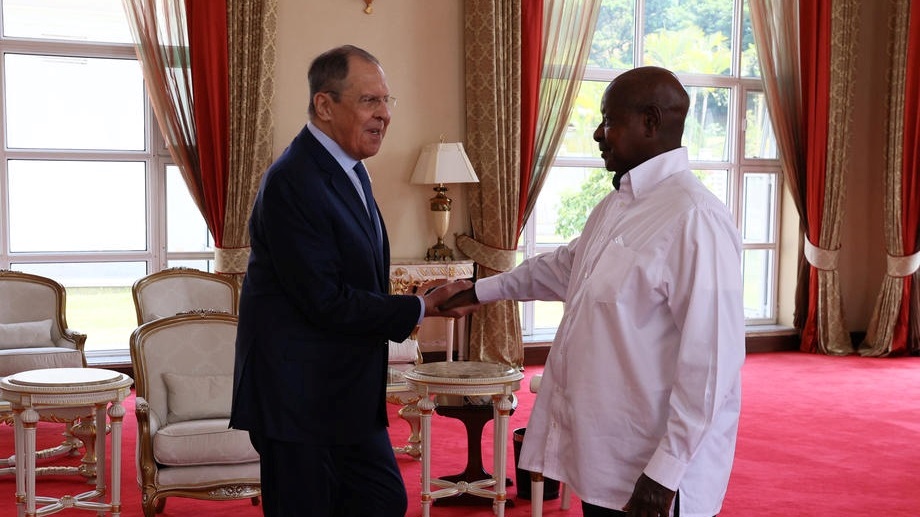
16 July 2022: Lavrov with Uganda President Yoweri Museveni in Entebbe[24]
The premise is clear and simple: ‘Russia has been among the few world powers without colonies in Africa, and has not participated in the slave trade throughout its history. Russia has helped, in every possible way, the peoples of the African continent to achieve their freedom and sovereignty’: this is the message that the Russian embassy in South Africa publishes on the occasion of the Abolition of Slavery Day on 2 December 2022[25].
It is an aggressive marketing operation that is launched in July 2022, in a great hurry: Ukraine is one of the world’s leading exporters of grain, and the export blockade caused by the war (partly because Ukrainian ports have been mined, partly because of seizures by the Russian army), generates a serious food crisis, especially in Africa and the Middle East. In the face of the conflict, many African countries take a neutral stance: during the vote on the UN resolution condemning Russia for its ‘aggression’ and calling for withdrawal from Ukraine, 17 African nations abstain, Ethiopia and Cameroon withdraw, while Mauritania, Kenya, Lesotho and Mauritius go from abstaining to voting in favour[26].
For Africa, maintaining good relations with the United States, Europe and Russia is an imperative; the food crisis threatens to undermine relations at a time of profound change in the trade balance. If Africa needs Russia, never before has Russia, isolated from the West, needed such a strategic trading partner. Steven Gruzd, head of the Russia-Africa programme at the South African Institute for International Affairs, explains Moscow’s strategy as follows: ‘It’s a propaganda war […] we have seen from the Ukrainian side how successfully President Zelensky has used social media […] He gives daily messages, he speaks to US parliaments and Congress and to groups all over the world. Basically, he is seen on the front line and Russia is preparing a counteroffensive’[27].
In July 2022, Russian Foreign Minister Sergey Lavrov is organising a tight tour of Africa. On his agenda he has appointments with political leaders in Egypt, Congo, Ethiopia, and Uganda. On 24 July, he meets the Secretary General of the Arab League Ahmed Aboul Gheit, the Egyptian President Abdel Fattah el-Sissi and Foreign Minister Sameh Shoukry in Cairo[28]: he reassures them that Russia is committed to meeting its grain export obligations under the recently signed agreement with Kiev[29].
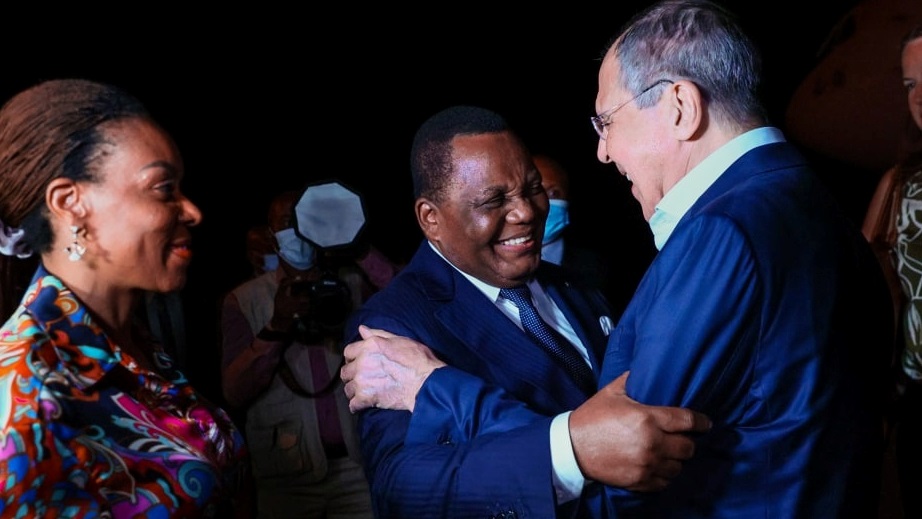
25 July 2022: Lavrov embraces Congolese Foreign Minister Jean-Claude Gakosso[30]
The opportunity is there to negotiate a free trade agreement with the Eurasian Economic Union (EAEU)[31] and the development of a free trade zone in Port Said, at the gateway to the Suez Canal[32]. Egypt is a key partner for Moscow, trade is worth around $5 billion a year, and its participation as the main foreign partner in the St. Petersburg International Economic Forum (SPIEF) confirms this[33]. A trade agreement through the EAEU would allow Egypt to trade more easily with the Islamic nations of Kazakhstan and Kyrgyzstan via the International North-South Transport Corridor (INSTC), via Iran[34].
Lavrov’s African tour continued, touching down in rapid succession in Congo, Uganda and Ethiopia, meetings in which he promised loyalty and trade agreements, denigrating the work of the United Nations (with them “we will have a world where the strongest rule”[35]) and without renouncing his attacks on the unreliability of the American currency in sustaining the world economy[36].
They are effective provocations: a few hours after Lavrov’s departure from Uganda, Washington announces a visit to Kampala the following week by the US ambassador to the UN, Linda Thomas-Greenfield[37]. To criticism of his friendly attitude towards Moscow, Ugandan President Museveni replied: ‘They have been with us for the last 100 years, how can we automatically be against them? How can we be against someone who never harmed us, who instead helped us? We do not believe in the idea of being the enemy of someone’s enemy’[38].
Military collaboration with South Africa and Eritrea
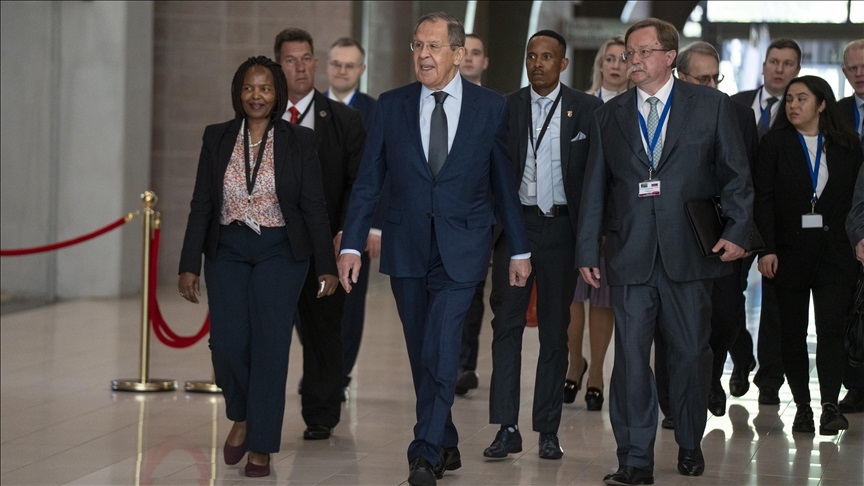
23 January 2023: Sergey Lavrov in South Africa meets Naledi Pandor[39]
On 23 January 2023 Lavrov meets his counterpart Naledi Pandor in Pretoria. The script is the same: promise proximity, support, and present a human and innocent face on the Ukrainian conflict, blaming the West for everything, even the soaring food prices[40]. But there’s more: Lavrov’s visit comes a few days after the South African armed forces announced that they would hold a joint military exercise called Operation Mosi II (Smoke) with the Russian and Chinese navies, to be held off the east coast of South Africa from 17 to 26 February – the anniversary of the invasion of Ukraine – with the warships arriving via the Indian Ocean: In early January, the frigate Gorshkov, equipped with the dreaded hypersonic Zircon missiles, set off across the Atlantic and Indian Ocean to land at the logistical support point in Tartus (Syria), and then take part in the exercise[41].
The Anglo-Saxon-dominated opposition party Democratic Alliance sharply criticises the decision, stating that in doing so, the ANC belies its neutral stance on the war in Ukraine and openly sides with Moscow. The Ukrainian ambassador to South Africa, Liubov Abravitova, says he does not understand why conducting exercises with “an army of rapists and murderers.”[42], while, in Pretoria, members of the Ukrainian community in South Africa protest against the visit by waving placards reading ‘Go home Lavrov’ and ‘Stop the lies! Stop the war’[43].
The exercises also cause great concern in the West, which, however, wants to avoid souring the delicate relations with the South African government, and even the diplomats in turmoil are called to order[44]: The EU Foreign Minister, Josep Borrell, after his recent conversation with Naledi Pandor, wrote that ‘the EU is not asking South Africa to take sides between Russia and the West but, in this context, the holding of naval military exercises with Russia and China on the anniversary of the Russian invasion of Ukraine is, to say the least, a cause for serious concern’. A cautious remark, but enough to provoke a harsh reaction from Pretoria[45].
South Africa is a historical ally of Russia. Their relations go back more than a hundred years. In 1896 Moscow established diplomatic relations with Abyssinia (Ethiopia) and the Republic of South Africa (Transvaal), sending doctors and training officers to support Negus Menelik’s army and supporting the Boers with hundreds of volunteers in the war against the British[46]. In more recent times, the Soviets support the South African Communist Party which, in coalition with the ANC, fights to end apartheid, even after the prohibition of the establishment of communist parties in South Africa[47].
Subsequently, South Africa and Russia form together with China, India and Brazil the ‘BRICS’ economic alliance, which has two main objectives: to compete on the world stage with the United States and the other Western economic powers; and to claim shared leadership from the international community. The BRICS countries now comprise more than 42% of the world’s population, 25% of the Earth’s total land area, 20% of the world’s GDP, and around 16% of international trade; the first informal meeting between the four countries, promoted by Russian Foreign Minister Lavrov himself, took place in September 2006 in New York, on the sidelines of the UN General Assembly[48].
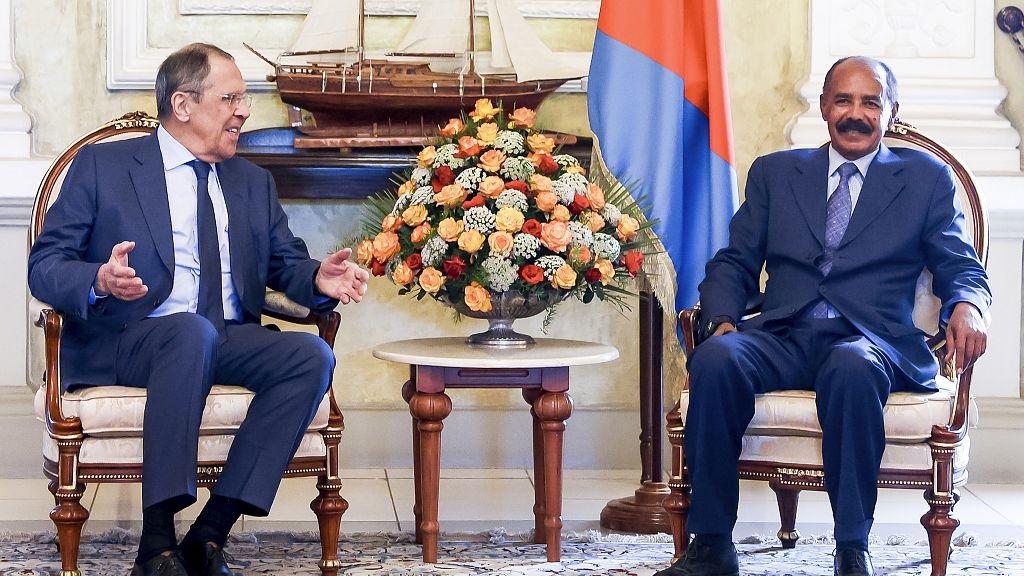
26 January 2023: Sergey Lavrov in conversation with Eritrean President Isaias Afwerki[49]
But there is also an internal political issue that drives South Africa into the arms of Mother Russia, and this concerns the poor state of the ruling party, the ANC, a party that has imploded since President Cyril Ramaphosa, who had based his election campaign on the fight against corruption, was caught in the act of violating tax laws. The party’s base, which is mainly financed by corruption, created a very deep crisis, which was resolved by an agreement between all the factions within the ANC – including those of Ramaphosa’s predecessors, such as Jacob Zuma and Tokyo Sexwale, who had been forced to resign precisely because of criminal scandals[50].
On 26 January, after also visiting Angola and the Kingdom of eSwatini (formerly Swaziland), Lavrov landed in Eritrea, one of the five states that, together with Russia, Belarus, Syria and North Korea, will vote in March 2022 against the UN resolution condemning the invasion of Ukraine. Eritrea is one of the most repressive countries in the world: a one-party state and a militarised society, a Constitution that has never been implemented, and ruled by the dictator Isaias Afwerki since 1993, the year of independence: Isaias holds absolute power, does not call political elections, controls the judiciary and an army dedicated to torture, killings and arbitrary arrests, and is accused by the United Nations of atrocious and systematic human rights violations[51] and crimes against humanity[52].
Foreign Minister Osman Saleh, meeting the Russian delegation, stated that he considered the Ukrainian crisis to be the result of a ‘reckless policy of hegemony and containment’ conducted by the United States for decades and that ‘Ukraine is both the pretext and the victim of this policy’[53]. Lavrov could not have expected a better welcome, and says: ‘We are grateful to our Eritrean friends for their continued support of Russian initiatives in the United Nations […] We note Asmara’s principled and balanced stance on issues concerning events in and around Ukraine’[54]. A true idyll.
During the meeting, topics of economic cooperation were discussed, particularly in the fields of energy, mining, information technology, education and health; a joint study was also revealed on the possibilities of exploiting the logistical potential and transit possibilities of the port of Massawa and its airport[55]: Eritrea is a strategic country due to its geopolitical position, since it is located in the Horn of Africa, facing the Red Sea, in the centre of naval routes of global importance.
Reconquering Iraq
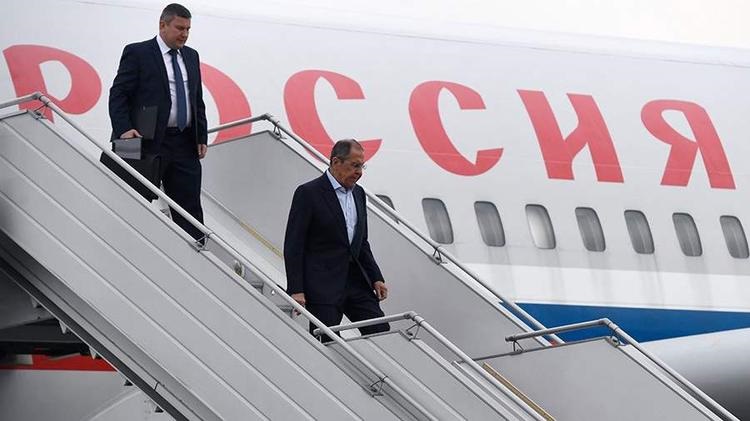
5 February 2023: Russian Foreign Minister Sergei Lavrov lands in Baghdad
Lavrov’s visit to Baghdad has a highly symbolic value: Iraq is a place where enormous strategic interests have historically intertwined and conflicted thanks to the bulky US military and commercial presence. Incidentally, since the installation of the last government, relations between Washington and Baghdad seem to be improving, reinforced by several recent diplomatic meetings[56]. But Iraq is also a territory with which Russia has had relations for decades: Moscow was a key partner during Saddam Hussein’s regime, although since 2003 its economic influence and privilege has been waning.
It is therefore time for a relaunch: during the visit Lavrov meets President Abdul Latif Rashid, Prime Minister Muhammad Shia al-Sudani, Parliament Speaker Muhammad Halbousi and Foreign Minister Fuad Hussein. The discussion focused on energy cooperation between the two countries, methods to circumvent US sanctions against Iraq and Russia, and security cooperation. The energy issue for Russia is relevant: its two oil giants, Lukoil and Gazprom, have more than ten billion dollars in investments and recently, due to sanctions, have serious difficulties receiving payments[57].
During Iraqi Prime Minister Mohammed Shia’ Sabbar Al- Sudani’s trip to Berlin on 12 January 2023, German Chancellor Olaf Scholz explored the possibility of importing gas from northern Iraq to Germany to replace Russian gas[58]. Brett McGurk, White House Coordinator for the Middle East and North Africa, and Amos Hochstein, US Coordinator for Global Infrastructure and Energy Security, land in Iraq to promote the Kurdish gas transfer project to Europe[59]. These are plans that seriously worry Moscow and, to stem the loss of huge market shares, Lavrov is trying to push Baghdad to use the gas internally or to transfer it to Syria and Turkey, rather than to Europe[60].
But Lavrov’s promised commitment goes beyond trade issues. Security is also at the centre of the agreements with Sudani: Iraq is a member of the RSII coalition, also known as the 4+1, an intelligence-sharing agreement between opponents of the Islamic State that also includes Russia, Syria, Iran and the Lebanese Hezbollah, and plays a crucial role due to its strategic position between Iran and Syria[61]. The two officials agree to intensify cooperation to combat terrorism and extremism also with the supply of military equipment; the Iraqi army already uses Russian tanks, Sukhoi planes and Russian cannons, and former Iraqi Defence Minister Juma Enad, in Moscow, discusses the purchase of military equipment and initiates new agreements for armour, drones and S400 air defence missile systems[62].
Should the deal work, this changes the entire Middle East scenario, because the US and the West are currently in the hands of the alliance between Israel, Saudi Arabia, Egypt, and the United Arab Emirates[63], which is producing the Palestinian genocide, allowing Jerusalem to bomb Damascus and Beirut undisturbed, and forcing all countries in the region to quickly and desperately seek new allies and protectors.
Mali distrusts the West
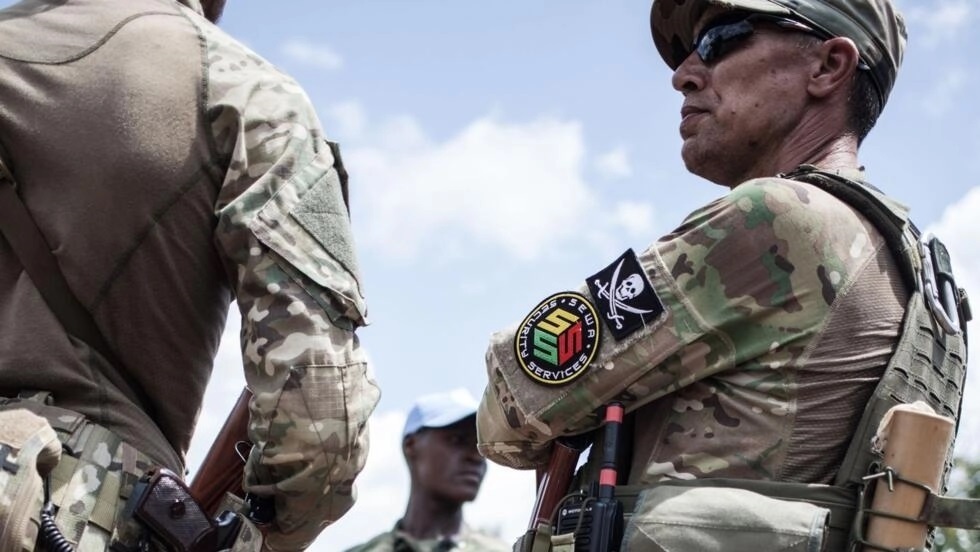
Russian mercenaries belonging to Sewa Security Services, a company owned by Evgheni Prigozhin[64]:: present in several hundred in the Sahel, they are accused of war crimes and systematic human rights violations[65]
Mali is a land battered by jihadist armed groups, which killed three times as many people in 2022 as in 2021[66], and by the continuous succession of coups d’état by military elites[67], which only exacerbate an already desperate situation and humanitarian emergency, as there are almost half a million internally displaced persons[68], 8.8 million people in need of humanitarian assistance (+17% since the beginning of 2022), and two million children under five suffering from acute malnutrition[69].
The West, after nine years of military operations in an attempt to stabilise the region, throws in the towel: on 17 February 2022, France, its European allies and Canada announce the withdrawal of troops in Operation Barkhane and Task Force Takuba (2400 French soldiers and 900 soldiers from allied states)[70]. Relations deteriorated with the coming to power of the military junta following the coup in August 2020. The mission’s poor results in the fight against terrorism fuels aversion against the West, both in the population and in the political entourage. The withdrawal of the Peacekeeping Force is experienced by the Malians as a betrayal, France is accused of arming Islamist fighters, carrying out acts of espionage and of being responsible for the extension of jihad, previously only localised in the northern region of the country[71], throughout the country.
The numerous coups d’état in the Sahel increasingly find favour with a population that sees the previous pro-French democratic governments as inadequate to counter the jihadist threat. The growing dissatisfaction with Western forces rolls out the red carpet to other powers, such as China[72] and Russia: open doors to a partner that does not exert pressure on Mali’s internal affairs, that does not call for fair elections and the defence of human rights, that has no intention of interfering in internal politics, all of which are seen as ‘neo-colonial’ and ‘destabilising’[73]. Towards the end of 2022, the MINUSMA peacekeeping mission, established in 2013, is also in serious trouble[74]: the government’s hostilities towards the UN troops are becoming more and more pressing, culminating in the expulsion of Guillaume Ngefa Atonodok Andali, head of the human rights section, in February 2023[75].
On 7 February 2023, Lavrov was received by Foreign Minister Abdoulaye Diop. Since President Assimi Goita has been in power, Russia’s support is enthusiastically welcomed. Lavrov, in a press conference, reveals that ‘last year we sent a large batch of Russian aviation technology, thanks to which the Malian army was recently able to conduct successful operations against terrorists’, adding that ‘a second batch of aviation technology for these purposes was delivered just recently, on 19 January’[76].
Lavrov means precisely: Moscow has sent Sukhoi fighter planes and reconnaissance and combat helicopters[77]. Russia also landed in Mali several hundred soldiers officially identified as ‘instructors’ – in addition to those already in place – but who are actually paramilitaries from Yevgeny Prigozhin’s Wagner group[78]. According to a report by the Combating Terrorism Centre, more than 1,000 mercenaries are deployed in the area and the Wagner group receives almost USD 11 million per month to provide security and training[79].
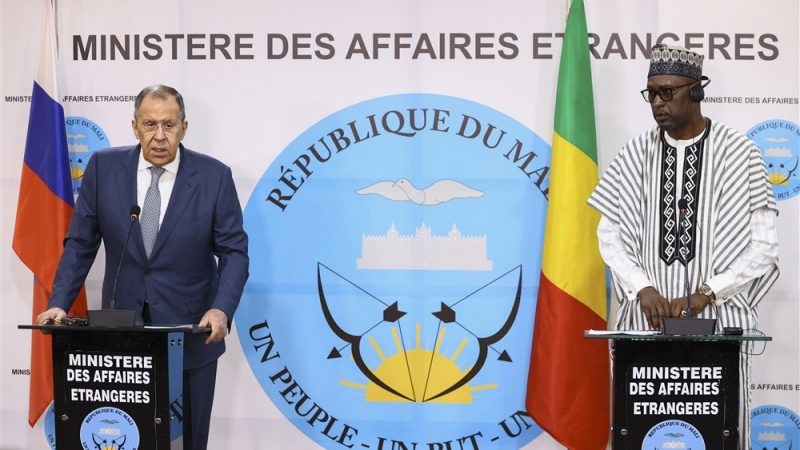
7 February 2023: Sergey Lavrov and Abdoulaye Diop during a press conference in Bamako[80]
And yet, despite Russian support, according to observers, diplomats, analysts and human rights groups, the country’s internal security is progressively and dramatically deteriorating[81], and extremists linked to al-Qaeda and the Islamic State group are growing stronger[82]. Assimi Goita denies everything: “The military success we have achieved in the last two years surpasses anything that has been achieved in the past decades. Our weapons are the pride of the entire nation’ and, according to him, the claims of the pacifists are just ‘fake news’[83].
The Royal United Services Institute does not believe at all that Wagner troops can make a significant contribution in the fight against terrorism: because of their limited knowledge of the territory, their strained relations with low-ranking officers in the local army, and because of their rigid command and control structure. According to the institute, Russia and the Wagner Group forces are much better at strengthening the grip of authoritarian regimes in power[84]. Killings, arbitrary arrests and torture perpetrated by ‘white soldiers’ against civilians are frequently reported, anonymously, for fear of retaliation; US Assistant Secretary of State Victoria Nuland says it is the Wagner Group itself that encourages the junta to deny peacekeepers access to areas where they have a mandate to investigate abuses[85].
Western concerns about the acceleration of relations between Russia and Mali are harshly rejected by Abdoulaye Diop himself, who states that he ‘does not need to justify to anyone the collaboration with Russia to strengthen the army and to import oil and grain’[86]. In reality, there is a huge risk that Mali is slipping into a dangerous cul-de-sac: having turned its back on the West for good and having tied itself to a non-transparent partner, the risk of finding itself under foreign military occupation is high. Having seized power by force and not by consensus, the junta leaders know they have popular support by tying themselves to the Russians, but the risk of international isolation is a possibility they may soon have to reckon with.
Africa, the arena of global imbalances
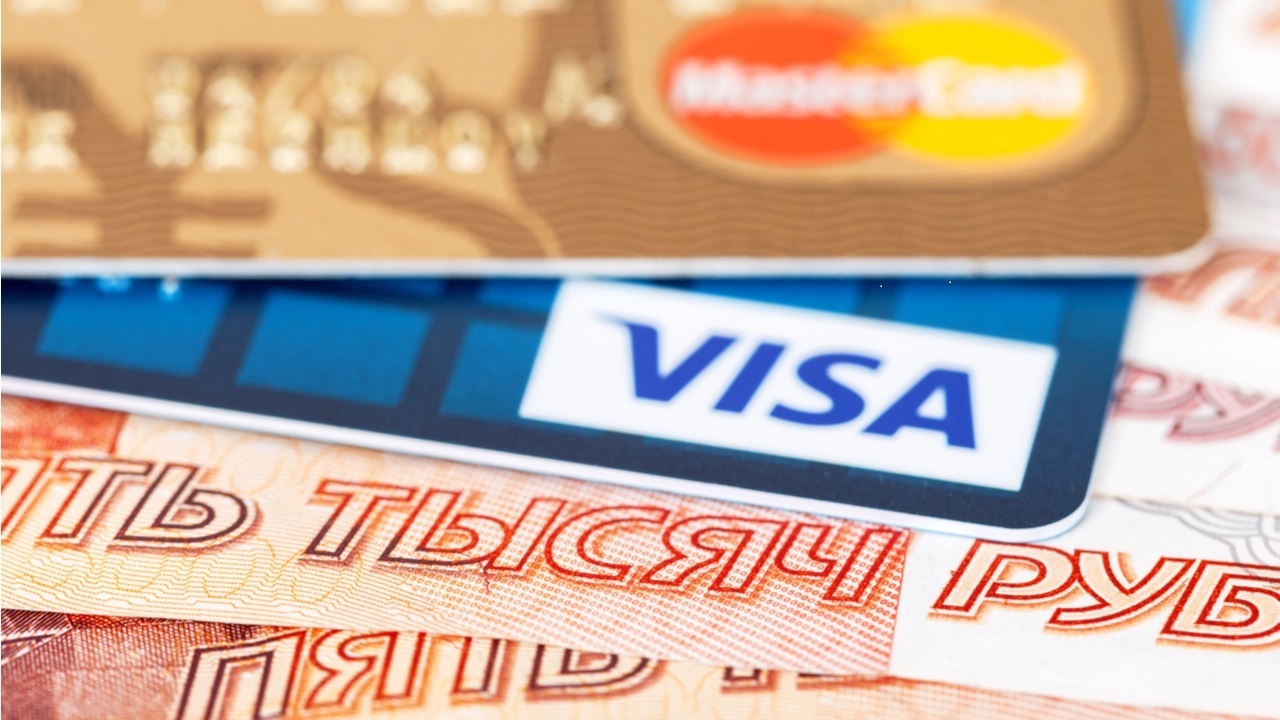
Russia, excluded from the SWIFT international circuit, prepares its counter-offensive[87]
Europe and the United States, committed for decades to transforming the states designed by colonialism into dependent, stable and democratic partners (an approach increasingly regarded with disdain as ‘post-colonial’), are now forced to confront a contender that operates according to different rules: Russia, which not surprisingly forges relations with the most unstable countries dominated by despots, which seeks to gain influence by choosing paths that offer security, without asking too many questions or demanding conditions, which wins the sympathy of autocrats by siding with them.
In light of the recent conflict in Ukraine, Moscow’s role in Africa takes on a different meaning: it is not just the search for a profitable source of minerals, but a battleground in which to weaken the West. In a press conference on 18 January 2023, Lavrov stated that his nation will host a second Russia-Africa summit in St Petersburg, starting 23 July, hinting that Russia could use the summit to sign agreements with African leaders that would allow them to circumvent US sanctions imposed over the war in Ukraine, including the introduction of a new trade system no longer calculated in dollars: ‘There will be new instruments of trade and investment cooperation, logistical chains and payment agreements. The transition to transactions in national currencies is underway’[88].
This last sentence hides a major revolution: due to its exclusion from the SWIFT global circuit, Moscow is relaunching the SPFS system (Financial Message Transmission System, in force since 2014[89]) to which more than 400 banks already belong, most of them Russian or from the former Soviet republics, but also some banks from Germany, Switzerland, France, Japan, Sweden, Turkey and Cuba[90]. In January 2023, Iran, cut off from the SWIFT circuit following the US sanctions waves of 2018, will also join the SPFS system, linking its own SEPAM system[91].
Aware of the fact that the invasion of Ukraine would bring with it severe economic sanctions, Russia is not unprepared, having already prepared a cross-border payment system. Since the first weeks of the Russian-Ukrainian war, the Bank of Russia and the People’s Bank of China have been working to establish a financial communication line to bypass SWIFT. The Chinese Cross-Border Interbank Payment System (CIPS), founded in 2015, is already used by 23 Russian banking institutions, including Credit Bank of Moscow, Asian-Pacific Bank, TransCapitalBank, Solidarity Bank, Ak Bars Bank, Absolut Bank and Bank Saint Petersburg, while Rosbank, Gazprombank and Alfa-Bank are preparing for a full connection to CIPS[92].
The aim is to establish an ‘eastern mega-platform’, linking Russia’s SPFS with China’s CIPS: Anatoly Aksakov, Chairman of the Duma’s Financial Markets Committee, says on 16 March 2022: ‘The Bank of Russia and the People’s Bank of China are working to link the Russian and Chinese systems for the transfer of financial messages, bypassing the international interbank payment transfer system SWIFT’[93].
If this works, there is no point in continuing to use sanctions that no one is any longer called upon to respect and no one can control. For now, the Russian invitation to join SPFS is extended to all countries belonging to the Shanghai Cooperation Organisation (SCO), which comprises eight states: in addition to China and Russia, India, Kazakhstan, Kyrgyzstan, Tajikistan, Pakistan and Uzbekistan[94]. But Lavrov’s trip to Africa paves the way for the extension of the system to the entire African continent, which would allow nations indebted to the West to be able to waive their debts.
The Russia-Africa summit on 23 July, announced by Lavrov, thus presents itself as a forerunner for the landing of the SPFS system in South Africa as well, an announcement that follows a few days later that of President Vladimir Putin, in which he invites the BRICS countries (Brazil, India, China and South Africa) to connect to his circuit[95]. The sanctions created to weaken the Kremlin show an important flipside of the coin: the expansion of a universe parallel to that of the dollar.
Always adept at occupying spaces left uncovered and exploiting the West’s vulnerabilities, as in the Middle East (by consolidating Bashar al-Assad’s regime in Syria), in North Africa with Libya, or in Latin America (by guaranteeing support to regimes hostile to Washington such as those in Venezuela and Nicaragua), Russia is preparing to design a new world order: in this framework, unfortunately, the invasion of Ukraine is but one move in an immense chessboard, and nothing more than a collateral event of a (currently) successful global strategy.
[1] https://www.military-today.com/missiles/buk.htm
[2] https://www.britannica.com/event/Malaysia-Airlines-flight-17
[3] https://www.dw.com/en/mh17-case-against-russia-is-admissible-european-court-rules/a-64511609
[4] https://currentaffairs.adda247.com/russia-china-and-south-africa-starts-joint-military-exercise/
[5] https://www.theguardian.com/world/2014/jul/29/economic-sanctions-russia-eu-governments
[6] https://www.atlanticcouncil.org/in-depth-research-reports/report/the-impact-of-western-sanctions-on-russia/#h-the-dominant-western-response-to-putin-s-aggression-was-sanctions
[7] https://www.aljazeera.com/news/2021/5/21/the-devastating-human-economic-costs-of-crimeas-annexation
[8] https://www.nbcnews.com/data-graphics/russian-bank-foreign-reserve-billions-frozen-sanctions-n1292153
[9] https://www.wsj.com/livecoverage/russia-ukraine-latest-news-2022-03-11/card/russia-suspended-from-bank-for-international-settlements-gEiXwjyiIlkp9jSTV7sU#:~:text=The%20Bank%20for%20International%20Settlements,Basel%2C%20Switzerland%2Dbased%20institution.
[10] https://www.offshore-technology.com/news/swift-ban-russia-energy/
[11] https://www.whitehouse.gov/briefing-room/statements-releases/2022/03/08/fact-sheet-united-states-bans-imports-of-russian-oil-liquefied-natural-gas-and-coal/#:~:text=Today%2C%20President%20Biden%20will%20sign,his%20needless%20war%20of%20choice.
[12] https://www.aa.com.tr/en/energy/oil/uk-to-phase-out-russian-oil-imports-by-end-of-2022/34805#:~:text=The%20UK%20announced%20on%20Tuesday,industrial%20strategy%2C%20said%20on%20Twitter.
[13] https://www.nytimes.com/2022/03/08/business/european-union-russia-oil-gas.html
[14] https://www.theguardian.com/world/2022/feb/22/germany-halts-nord-stream-2-approval-over-russian-recognition-of-ukraine-republics
[15] https://www.morganlewis.com/pubs/2022/04/update-extensive-sanctions-on-russia-focus-on-luxury-goods
[16] https://10hundred.mayerbrown.com/russia-ukraine-sanctions-update-eu-sanctions-february-23-2022/
[17] https://www.reuters.com/business/airspace-closures-after-ukraine-invasion-stretch-global-supply-chains-2022-03-01/
[18] https://www.dailymail.co.uk/news/article-10548677/Government-bans-Russian-aircraft-UK-airspace-MIDNIGHT.html
[19] https://www.glistatigenerali.com/imprenditori_russia/quando-gli-oligarchi-prendono-il-largo/?fbclid=IwAR02Sve-zinXWn8WUXSfvBIpBu5fTyjbUHVrzsqOcb1a_7wvSm7zdmVXPQ8
[20] https://www.gov.uk/government/news/foreign-secretary-sanctions-386-russian-lawmakers-who-supported-putins-invasion-of-ukraine#:~:text=Embargoes%20and%20sanctions-,Foreign%20Secretary%20sanctions%20386%20Russian%20lawmakers%20who%20supported%20Putin’s%20invasion,regions%20of%20Luhansk%20and%20Donetsk.
[21] https://www.theguardian.com/world/2022/feb/25/eu-to-announce-sanctions-targeting-vladimir-putin-and-sergei-lavrov
[22] https://ec.europa.eu/commission/presscorner/detail/en/statement_23_907
[23] https://ec.europa.eu/commission/presscorner/detail/en/statement_23_907
[24] https://www.euractiv.com/section/global-europe/news/ugandan-leader-extols-africa-russia-friendship-during-visit-by-lavrov/
[25] https://twitter.com/EmbassyofRussia/status/1598615938869432322?s=20&t=W013aDJF14pV8lnWiYGQ-Q
[26] https://www.chathamhouse.org/2022/03/un-vote-russia-invasion-shows-changing-africa
[27] https://www.voanews.com/a/russian-visit-to-africa-seen-as-chance-to-counteract-western-narrative/6672953.html
[28] https://www.voanews.com/a/russia-fm-visits-egypt-part-of-africa-trip-amid-ukraine-war-/6671573.html
[29] https://www.crisisgroup.org/europe-central-asia/eastern-europe/ukraine/who-are-winners-black-sea-grain-deal
[30] https://www.euractiv.com/section/global-europe/news/lavrov-courts-africa-in-quest-for-more-non-western-friends/
[31] https://www.russia-briefing.com/news/eurasian-economic-union-free-trade-agreement-negotiations-with-egypt-at-an-advanced-stage.html/
[32] https://www.russia-briefing.com/news/russia-egypt-agree-set-industrial-zone-east-port-said.html/
[33] https://www.sis.gov.eg/Story/169512?lang=en-us
[34] https://www.business-standard.com/article/international/explained-instc-the-transport-route-that-has-russia-and-india-s-backing-122071400697_1.html
[35] https://www.africanews.com/2022/07/27/ethiopia-lavrov-meets-govt-leaders-in-addis-attacks-global-reliance-on-us-dollar//
[36] https://www.africanews.com/2022/07/27/ethiopia-lavrov-meets-govt-leaders-in-addis-attacks-global-reliance-on-us-dollar//
[37] https://www.voanews.com/a/us-diplomat-visits-uganda-week-after-lavrov-visit-/6688572.html
[38] https://www.theafricareport.com/227607/uganda-lavrov-visit-to-museveni-creates-headache-for-washington/
[39] https://www.aa.com.tr/en/africa/russian-foreign-minister-lavrov-in-south-africa-for-bilateral-talks/2794930
[40] https://apnews.com/article/putin-politics-ukraine-government-sergey-lavrov-south-africa-7ce71f11d2b56790621d21f90c57d420
[41] https://www.aljazeera.com/news/2023/1/23/russian-warship-to-join-drills-with-china-south-africa
[42] https://www.voanews.com/a/south-africa-hosts-russian-foreign-minister-despite-criticism-/6930253.html
[43] https://www.lemonde.fr/en/le-monde-africa/article/2023/01/23/south-africa-hails-friendship-with-russia-amid-ukraine-war_6012740_124.html
[44] https://www.dailymaverick.co.za/article/2023-02-11-western-diplomats-raise-alarm-on-south-africa-russia-china-joint-naval-exercise-during-anniversary-of-ukraine-invasion/
[45] https://www.dailymaverick.co.za/article/2023-02-11-western-diplomats-raise-alarm-on-south-africa-russia-china-joint-naval-exercise-during-anniversary-of-ukraine-invasion/
[46] https://tsarnicholas.org/2020/09/16/nicholas-ii-and-the-boer-war/
[47] https://www.sahistory.org.za/article/south-african-communist-party-timeline-1870-1996
[48] https://leg16.camera.it/465?area=2&tema=760&BRICS+%28Brasile%2C+Russia%2C+India%2C+Cina+e+Sudafrica%29
[49] https://www.africanews.com/2023/01/27/russian-foreign-minister-visits-eritrea-an-ally-in-its-war-on-ukraine//
[50] SUDAFRICA: L’OMBRA DELLE GANG DIETRO L’ENNESIMO SCANDALO | IBI World Italia
[51] https://er.usembassy.gov/title-2020-country-reports-on-human-rights-practices-eritrea/
[52] https://www.dw.com/en/eritrean-government-systematically-committed-crimes-against-humanity/a-19314042
[53] https://www.reuters.com/world/lavrov-bolsters-eritrean-support-russia-conflict-with-ukraine-2023-01-27/
[54] https://tass.com/world/1567763
[55] https://twitter.com/hawelti/status/1618654898102632451
[56] https://www.usip.org/publications/2023/02/us-iraq-emphasize-economic-cooperation-core-strategic-partnership
[57] https://www.theedgemarkets.com/node/654150
[58] https://www.reuters.com/business/energy/germany-talks-with-iraq-over-possible-gas-imports-chancellor-2023-01-13/
[59] https://presidency.gov.krd/en/president-nechirvan-barzani-meets-with-a-high-level-us-delegation/
[60] https://www.al-monitor.com/originals/2023/02/russias-lavrov-iraq-looks-sanctions-relief
[61] https://foreignpolicy.com/2015/09/28/russia-iran-iraq-and-syria-to-share-intelligence-on-islamic-state/
[62] https://www.al-monitor.com/originals/2023/02/russias-lavrov-iraq-looks-sanctions-relief
[63] THE NEW COLD WAR | IBI World Italia
[64] https://www.atlasofwars.com/russia-and-the-wagner-groups-strategic-presence-in-africa/
[65] https://news.un.org/en/story/2023/01/1133007
[66] https://www.africarivista.it/mali-i-jihadisti-imperversano-e-i-golpisti-vogliono-riformare-la-costituzione/212409/
[67] https://ibiworld.eu/2021/06/07/guerre-etniche-religiose-coloniali-e-vendette-tribali-il-mali-come-metafora-del-disastro-globale/
[68] https://www.unhcr.org/it/notizie-storie/notizie/mali-violenze-e-minacce-a-opera-di-gruppi-armati-continuano-a-costringere-alla-fuga-civili-e-rifugiati/
[69] https://news.un.org/en/story/2023/01/1132932
[70] https://www.france24.com/en/france/20220217-live-macron-holds-conference-on-sahel-engagement-as-france-poised-to-withdraw-troops-from-mali
[71] https://www.politico.eu/article/mali-accuse-france-arming-jihadist/
[72] https://www.fmprc.gov.cn/mfa_eng/wjdt_665385/wshd_665389/202209/t20220923_10770366.html
[73] https://www.voanews.com/a/russian-foreign-minister-lavrov-visits-mali/6951657.html
[74] https://www.crisisgroup.org/africa/sahel/mali/minusma-crossroads
[75] https://www.arabnews.com/node/2245406/mondo
[76] https://www.reuters.com/world/africa/russias-lavrov-says-moscow-will-continue-helping-mali-improve-its-military-2023-02-07/
[77] https://www.bbc.com/news/world-africa-64555169
[78] https://www.euronews.com/2023/02/08/russian-foreign-minister-sergei-lavrov-visits-mali-in-sign-of-deepening-ties
[79] https://www.voanews.com/a/violence-soars-in-mali-in-the-year-after-russians-arrive/6918510.html
[80] https://www.euractiv.com/section/global-europe/news/mali-says-no-need-to-justify-russia-as-partner-as-lavrov-visits/
[81] https://www.securitycouncilreport.org/monthly-forecast/2023-01/mali-21.php#:~:text=The%20overall%20security%20situation%20in,tens%20of%20thousands%20of%20people.
[82] https://www.voanews.com/a/violence-soars-in-mali-in-the-year-after-russians-arrive/6918510.html
[83] https://www.bbc.com/news/world-africa-64555169
[84] https://www.voanews.com/a/violence-soars-in-mali-in-the-year-after-russians-arrive/6918510.html
[85] https://www.voanews.com/a/violence-soars-in-mali-in-the-year-after-russians-arrive/6918510.html
[86] https://www.euractiv.com/section/global-europe/news/mali-says-no-need-to-justify-russia-as-partner-as-lavrov-visits/
[87] https://news.bitcoin.com/visa-and-mastercard-suspend-operations-in-russia-as-part-of-sanctions-over-ukraine/
[88] https://www.cbsnews.com/news/ukraine-news-russia-war-south-africa-china-military-exercise-us-concerned/
[89] https://ibiworld.eu/2023/01/26/haftar-la-spia-che-venne-dal-freddo/
[90] https://www.reuters.com/business/finance/russias-swift-alternative-expanding-quickly-this-year-says-cbank-2022-09-23/
[91] https://www.aljazeera.com/news/2023/2/8/whats-behind-iran-and-russias-efforts-to-link-banking-systems
[92] https://www.banki.ru/news/lenta/?id=10969186
[93] https://tass.com/economy/1423101 ; https://www.youtube.com/watch?v=jYk6ym6NPhg
[94] https://www.russia-briefing.com/news/russia-offers-the-shanghai-cooperation-organisation-countries-connection-to-russia-s-version-of-swift.html/
[95] https://waltainfo.com/russian-swift-replacement-ready-for-brics-putin/
Leave a Reply